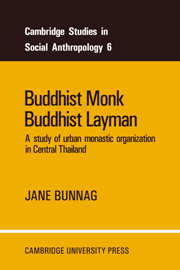Book contents
- Frontmatter
- Contents
- List of tables
- List of illustrations
- Preface
- Map A Thailand
- Introduction: the Thai social system
- 1 ‘The way of the monk’
- 2 The monk and the lay community
- 3 The wat community
- 4 The wat and its social matrix
- 5 The role of the Buddhist layman
- 6 The loosely structured social system: red herring or rara avis?
- Appendixes
- Bibliography
- Index
Introduction: the Thai social system
Published online by Cambridge University Press: 06 January 2010
- Frontmatter
- Contents
- List of tables
- List of illustrations
- Preface
- Map A Thailand
- Introduction: the Thai social system
- 1 ‘The way of the monk’
- 2 The monk and the lay community
- 3 The wat community
- 4 The wat and its social matrix
- 5 The role of the Buddhist layman
- 6 The loosely structured social system: red herring or rara avis?
- Appendixes
- Bibliography
- Index
Summary
The Siamese are a people incapable of retaining one spark of animosity, and during my stay in Bangkok I do not remember a single instance of seeing two Siamese come to blows and seldom even quarrel. They have been taught from their infancy to obey and respect every grade, from the King to those just one degree above them; and from their inferiors they in their turn receive that homage they pay to others; hence even were they so disposed opportunities seldom offer which would admit of a dispute.
From Residence in Siam by Frederick Arthur Neale (London, 1852, p. 148)For the majority of the Thai population it is axiomatic that to be Thai is to be Buddhist. Nevertheless, and not unnaturally, different individuals exhibit different degrees of religious commitment and interest and respond in a variety of ways to the religious opportunities available. The differences in temperament and personal inclination which to some extent condition this variety lie beyond the scope of the present study. Instead I have tried to analyze religious role performance in terms of its correlation with the social and economic status of individual actors. As will presently become clear a person's income, educational qualifications, and present life-style provide fairly reliable indicators as to how he will conceive of his role as a Buddhist: men from a rural background are for instance more likely than their urban fellows to make a career for themselves in the Buddhist Sangha.
- Type
- Chapter
- Information
- Buddhist Monk, Buddhist LaymanA Study of Urban Monastic Organization in Central Thailand, pp. 1 - 28Publisher: Cambridge University PressPrint publication year: 1973



